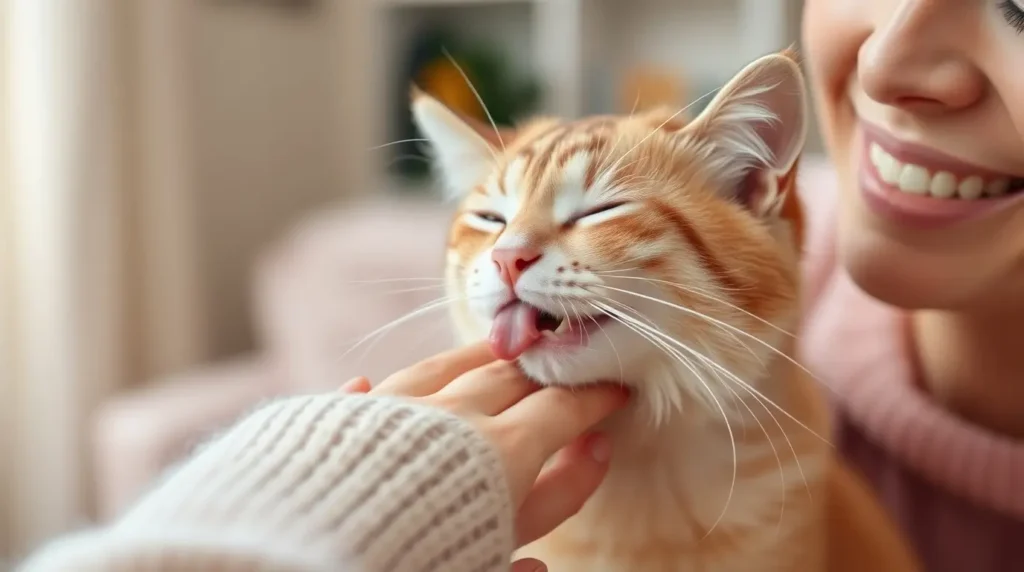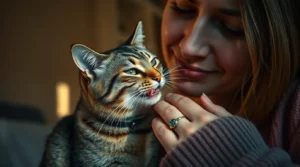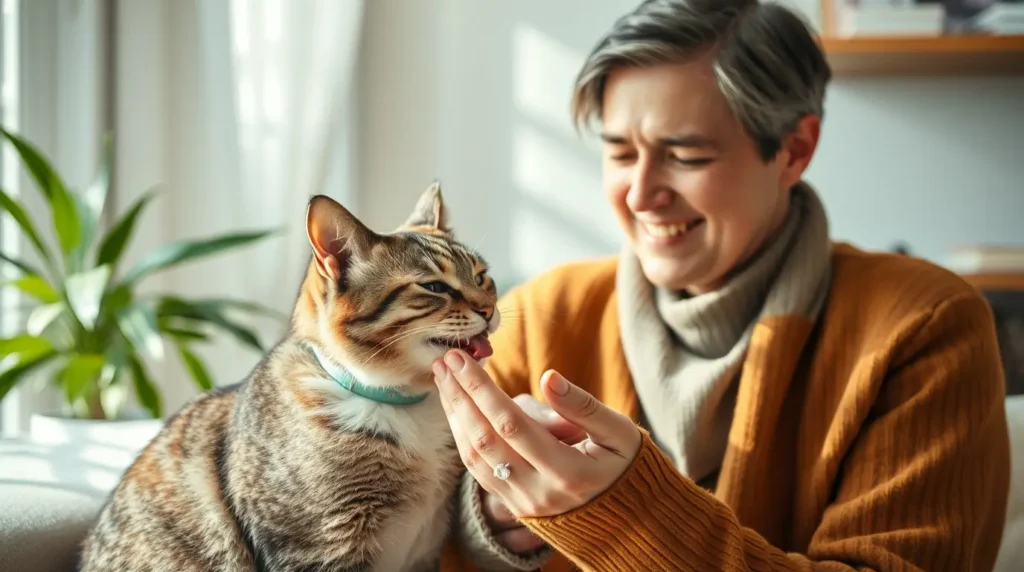Introduction
Cats are fascinating creatures with many unique behaviors, and one of the most intriguing is their habit of licking their owners. If you’ve ever wondered, why do cats lick you?, you’re not alone. At Whizpet, we conducted in-depth research to understand why do cats lick you and how this behavior connects to feline instincts and emotions.
There are several reasons behind why do cats lick you. It could be a sign of affection, much like how a mother cat grooms her kittens. Licking can also be a way for cats to mark their territory, spreading their scent to claim you as part of their family. Additionally, grooming is a natural feline instinct, and sometimes, cats extend this habit to their trusted humans.
Our research at Whizpet found that many cat owners misinterpret licking behavior, assuming it’s always a sign of love. However, excessive licking may indicate stress, anxiety, or even an underlying health issue. By understanding this behavior and paying attention to your cat’s needs, you can build a stronger bond and ensure their happiness and well-being.
Why Do Cats Lick You? Top Reasons Explained
Cats are known for their unique and sometimes puzzling behaviors, and licking is one of them. If you’ve ever wondered, why do cats lick you?, there are several possible explanations. Whether it’s a sign of love, a natural instinct, or a way to communicate, this behavior plays a significant role in a cat’s life. Below, we explore the top reasons cats lick their owners and what it means.
1. A Sign of Affection
Cats often lick their owners as a sign of affection.Similar to how a mother cat grooms her kittens, licking is a way to bond and strengthen relationships. When your cat licks you, it’s a sign of their love and trust.This behavior is often seen between cats that are closely bonded, and if your cat licks you, it means they see you as part of their family. It’s their version of a hug or kiss, reinforcing the connection they feel with you.
2. Marking Their Territory
Cats have scent glands on their tongues, and when they lick you, they are depositing their scent to mark you as their own. This territorial behavior helps cats feel secure by creating a familiar scent environment. If your cat licks you frequently, they may be reinforcing their bond with you while subtly warning other pets that you belong to them. This behavior is especially common in multi-pet households where a cat may feel the need to establish dominance or security.
3. Grooming Instincts
Cats are naturally clean animals, spending a significant portion of their day grooming themselves. When cats lick their owners, they may be extending their grooming habits to include you. In the wild, cats groom members of their group to reinforce social bonds and maintain cleanliness. If your cat licks you, it could be a sign that they see you as part of their social group and feel responsible for keeping you clean, just as they would a fellow cat.
4. Seeking Attention
Sometimes, cats use licking as a way to get your attention. If they want food, playtime, or affection, licking is one way they communicate their needs. If you notice your cat licking you persistently and then looking at you expectantly, they may be trying to tell you something. Paying attention to when and how often your cat licks you can help you understand their specific requests, whether it’s mealtime, cuddle time, or a need for interactive play.
5. Exploring with Their Tongue
Cats experience the world through their senses, including taste and texture. Their tongues have tiny barbs that allow them to investigate different surfaces. If you have lotion, sweat, or an unfamiliar scent on your skin, your cat may lick you out of curiosity. This exploratory behavior helps them learn more about their environment and their human companions. If your cat’s licking seems excessive, however, it may be worth checking for any stress-related causes or underlying health concerns.

Understanding Your Cat’s Licking Behavior
While occasional licking is completely normal and often a sign of affection, excessive licking can sometimes indicate stress, anxiety, or an underlying medical issue. If you notice a sudden increase in licking behavior, it may be worth evaluating your cat’s environment to ensure they feel safe and secure. Offering plenty of interactive play, a comfortable space, and a consistent routine can help minimize stress-related behaviors.
Why Do Cats Lick You While Being Petted?
When cats lick you while being petted, it’s a strong sign of trust and affection. This behavior is similar to how cats groom each other as a way of bonding. By licking you, your cat is acknowledging you as part of their family and expressing their comfort around you. Additionally, cats lick while being petted to reciprocate the affection they receive. If your cat does this frequently, it means they enjoy your company and feel safe with you. However, if the licking turns into biting, it could indicate overstimulation, so watch for signs that your cat needs a break.
Why Do Cats Lick You Then Bite You?
When cats lick you and then bite, it can be a sign of mixed emotions. Often, this behavior starts as an affectionate gesture but turns into a gentle bite due to overstimulation. Some cats get excited while licking and may instinctively nibble as part of their playfulness. In other cases, cats lick followed by a bite to communicate their boundaries, signaling that they need a break from petting. If your cat exhibits this behavior frequently, pay attention to their body language to understand when they want affection and when they need space.
Why Do Cats Lick Your Face?
Cats often lick your face as a way of showing affection and strengthening their bond with you. This behavior mimics the way mother cats groom their kittens, signifying trust and care. Additionally, cats lick your face because they are attracted to the scent of your skin, especially if it carries traces of food, sweat, or lotion. Some cats may also lick to mark their territory, spreading their scent as a way of claiming you as their own. While occasional face licking is normal, excessive licking could indicate stress or a need for attention from your feline companion.
Why Do Cats Lick Themselves Excessively?
Excessive licking in cats can indicate underlying issues such as stress, allergies, or skin conditions. If you notice your cat constantly grooming, it may be a response to anxiety, discomfort, or even boredom. Cats often lick themselves to soothe irritation caused by fleas, dry skin, or infections. In some cases, compulsive licking can lead to bald patches or sores, signaling a more serious problem. Since cats lick to maintain cleanliness, an increase in this behavior shouldn’t be ignored. If your cat is licking excessively, consult a veterinarian to identify the cause and ensure your feline friend stays healthy and comfortable.
5 Most Demanding FAQs About Why do Cats Lick you
1. Why do cats lick you when you pet them?
When cats lick you while being petted, they are expressing trust, affection, and bonding with you.
2. Why does my cat lick me then bite me?
This could be due to overstimulation, playful behavior, or a way to communicate their boundaries.
3. Why do cats lick your face?
Cats lick your face to show affection, mark their territory, or simply because they are drawn to the scent of your skin.
4. What does it mean when a cat licks your hand?
When a cat licks your hand, it could be a grooming instinct, a sign of trust, or a way to seek attention.
5. Why is my cat licking me so much all of a sudden?
Sudden excessive licking may indicate anxiety, a new scent on your skin, or an underlying health issue. Monitoring their behavior and consulting a vet if necessary is recommended.

Conclusion
Understanding why cats lick can help strengthen your bond with your feline companion. Whether they are showing affection, grooming, or marking their territory, this behavior is a natural part of feline communication. If your cat’s licking becomes excessive, consider their environment, diet, and stress levels. By paying attention to these signs, you can ensure a happy and healthy relationship with your furry friend. If you found this guide helpful, share it with fellow cat lovers and stay connected with Whizpet for more expert pet care insights!
Call To Action
Want to understand your cat’s behavior better? Stay informed with expert insights from Whizpet! If you found this guide helpful, share it with fellow cat lovers and help them decode their feline’s licking habits.
For more pet care tips, subscribe to our newsletter and never miss an update on keeping your furry friend happy and healthy!
Related blog: For more detailed information about pet care

